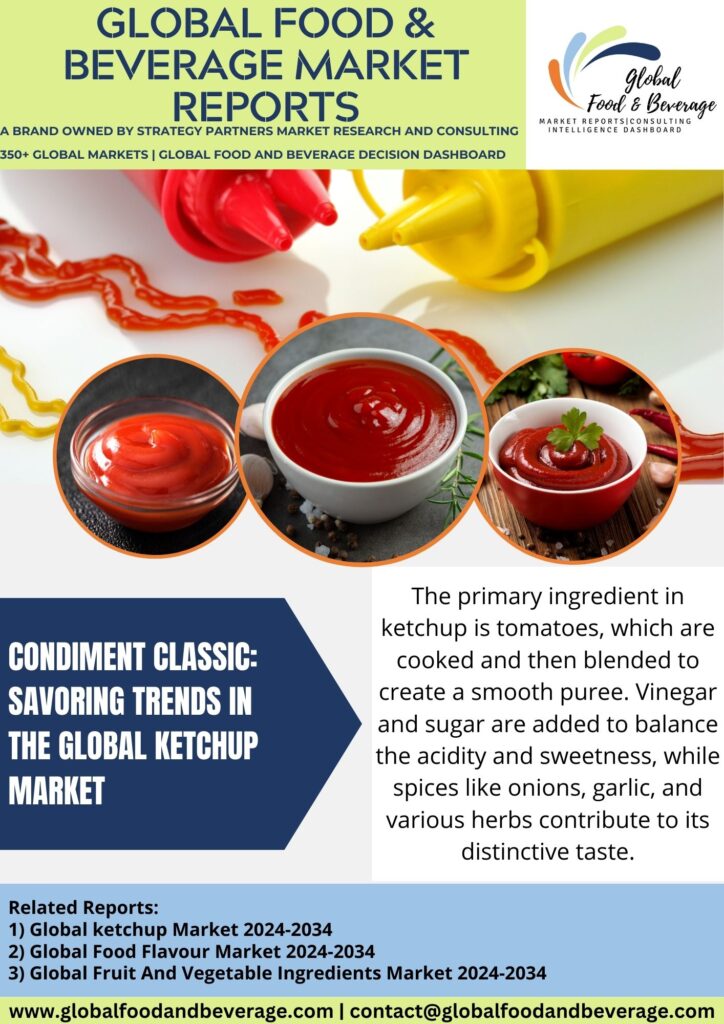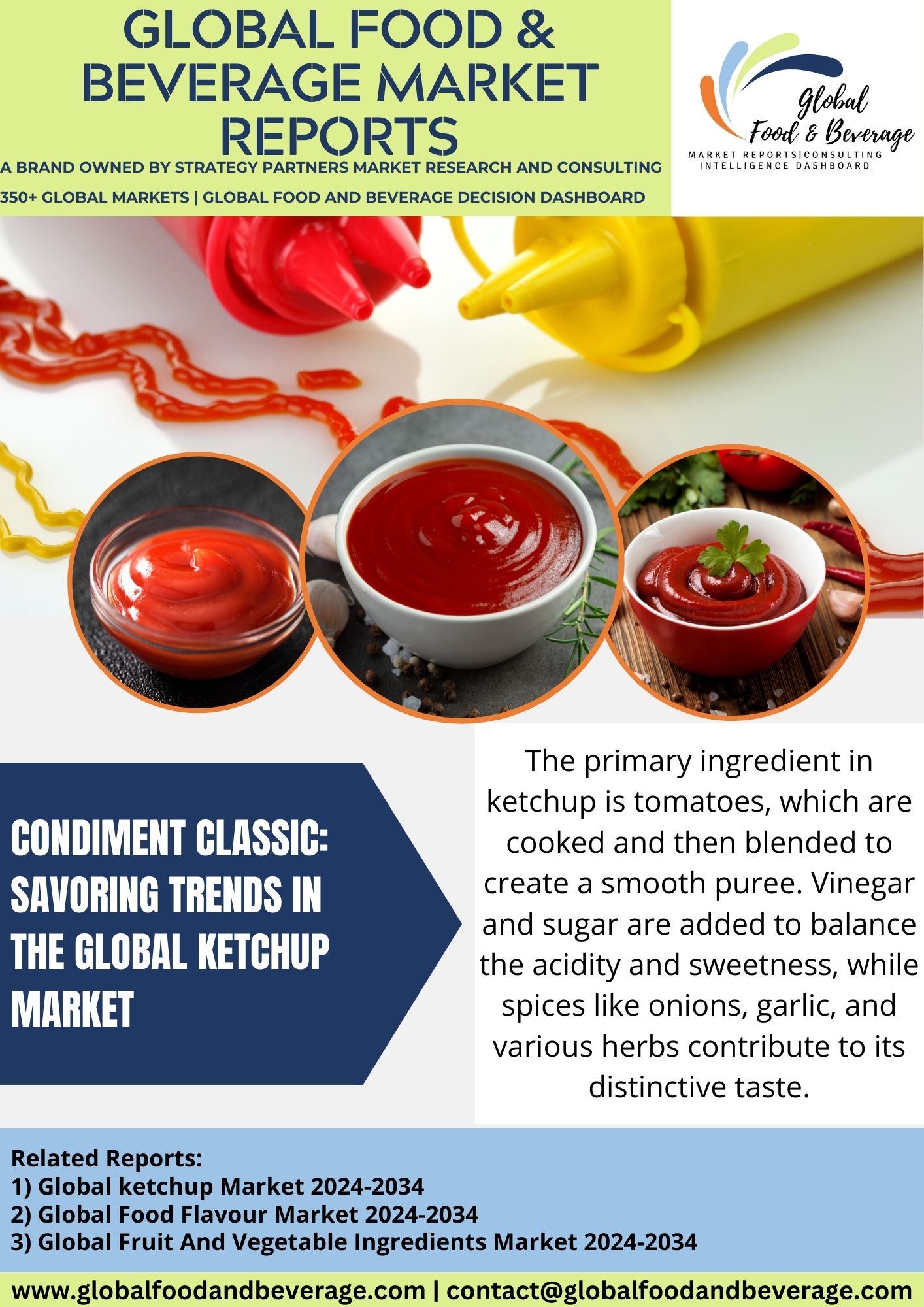
Condiment Classic: Savoring Trends in the Global Ketchup Market
Ketchup, a ubiquitous condiment found on tables around the world, has a rich history and a flavor profile that transcends cultural boundaries. Originating from Chinese fermented sauces, ketchup evolved over centuries and took on different forms before becoming the sweet and tangy tomato-based condiment that is widely popular today. In the early 19th century, tomatoes were incorporated into the recipe, transforming ketchup into the iconic red sauce we recognize.
Tomato ketchup is not merely a flavorful accompaniment but has become a culinary staple, enhancing the taste of a myriad of dishes. Its sweet and tangy combination, often complemented by vinegar, sugar, and an array of spices, adds a distinctive zing to burgers, hot dogs, fries, and various other savory delights. Ketchup’s versatility extends beyond the classic pairings; it serves as a base for countless sauces, dressings, and marinades, showcasing its ability to adapt to diverse culinary creations.
The commercial success of ketchup owes much to the iconic brand Heinz, whose recipe, developed in the late 19th century, has become synonymous with quality and consistency. The company’s distinctive glass bottles, featuring the signature slow-pouring texture, have become emblematic of ketchup itself. The condiment’s popularity has led to numerous variations, including organic, low-sugar, and spicy options, catering to evolving consumer preferences and dietary trends.
Ketchup’s global appeal is undeniable, yet regional preferences and adaptations have emerged. In some countries, such as India, ketchup might be infused with local spices or chilies, reflecting the culinary diversity of each region. Additionally, creative reinterpretations, like fruit-based ketchups or artisanal small-batch productions, showcase the condiment’s ability to evolve with contemporary gastronomic trends.
Beyond its culinary significance, ketchup has woven itself into the fabric of popular culture. Its distinctive flavor and nostalgic association with childhood make it a comfort food for many. Whether dolloped on a classic diner meal or featured in gourmet kitchens, ketchup’s enduring popularity lies in its ability to enhance the dining experience and evoke a sense of familiarity in a world of diverse cuisines.
ADVANCEMENTS
The world of ketchup, a condiment with a rich history, showcase a blend of innovation, health consciousness, and sustainability. One significant breakthrough is the development of alternative ketchup formulations. Manufacturers are exploring sugar-free and reduced-sugar options to meet the growing demand for healthier condiments. This aligns with consumer preferences for reduced sugar intake and addresses concerns related to the health impact of high sugar content in traditional ketchups.
In response to dietary preferences and allergen concerns, there is a surge in the production of organic and gluten-free ketchups. Companies are using organic tomatoes and natural sweeteners while eliminating common allergens, providing options for consumers with specific dietary requirements or those seeking cleaner, more natural ingredient lists.
Advancements in packaging contribute to the sustainability of ketchup products. Companies are adopting eco-friendly packaging materials, including recyclable bottles and biodegradable packaging, to reduce their environmental impact. This reflects a broader industry trend towards sustainability and corporate responsibility.
Flavor innovations in ketchup are expanding beyond traditional tomato-based formulations. Unique and exotic flavor variations, such as spicy, fruity, or herb-infused ketchups, are gaining popularity. These innovative flavors cater to adventurous taste preferences and offer consumers a broader range of choices.
The integration of technology and smart packaging in the ketchup industry is growing. QR codes on packaging provide consumers with information about the product’s origin, ingredients, and even recipe suggestions, enhancing transparency and engagement with the brand.
CHALLENGES
The ketchup industry faces challenges across production, formulation, market dynamics, consumer preferences, and sustainability. One significant challenge is achieving the right balance of taste and texture in ketchup products. The formulation process, which involves achieving the perfect blend of sweetness, acidity, and thickness, poses ongoing challenges for manufacturers.
Quality control in ketchup production is crucial for maintaining consistency in flavor, color, and texture across batches. Stringent quality assurance measures are necessary to meet consumer expectations and uphold the reputation of ketchup products in the market.
Market competition is intense, with numerous ketchup products available globally. Successfully differentiating products, addressing diverse flavor preferences, and staying competitive require continuous innovation in formulations, packaging, and marketing strategies.
Meeting regulatory compliance, especially concerning labeling, safety standards, and ingredient regulations, adds complexity to the ketchup industry. Adhering to diverse regulations across regions or countries demands continuous diligence to ensure transparency and compliance with evolving standards.
Consumer preferences, including the demand for natural and healthier alternatives, present challenges in the ketchup industry. As consumers become more health-conscious, reducing sugar content, eliminating artificial additives, and incorporating organic ingredients are areas that demand innovation in ketchup formulations.
Sustainability considerations, such as responsible sourcing of ingredients and eco-friendly packaging, are emerging challenges. Meeting consumer demands for ethical and sustainable practices adds complexity to the production and marketing of ketchup.
Consumer education is vital for promoting the various uses and benefits of ketchup products. Effectively communicating the versatility, convenience, and potential applications of ketchup is crucial for building consumer awareness and trust.
CONCLUSION
Ketchup remains an iconic condiment, transcending culinary boundaries with its tangy sweetness. From classic tomato varieties to diverse flavor infusions, it continues to evolve, adapting to global tastes. The industry’s dedication to quality ingredients and innovative formulations reflects its resilience in the ever-changing world of gastronomy. As consumer preferences shift towards cleaner labels and unique twists on traditional flavors, ketchup stands as a versatile companion in kitchens worldwide. The future promises a continued journey of exploration, where this beloved condiment not only maintains its timeless appeal but also embraces diverse culinary influences, ensuring its place as a flavorful and enduring staple on tables around the globe. The Ketchup Market is a well-established and globally recognized segment within the condiment industry.
